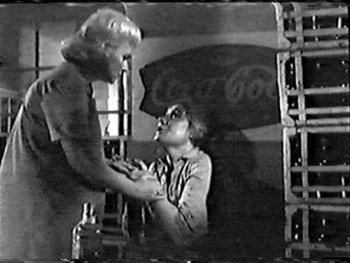Game Without Rules
[Игра без правил]

USSR. Sverdlovskaia kinostudiia. 1965. 96 minutes. Black and white.
Directed: Iaropolk Lapshin
Written: Leb Sheinin
Camera: Vasilii Kirbizhekova
With: Mikhail Kuznetsov, Viktor Dobrovol'skii, Tat'iana Karlova
"Times have changed" is one of the repeated phrases in Lapshin's 1965 film about Soviet Cheka agents and American intelligence officers in postwar Germany. In the opening scene the American Thomas Kern greets two Soviet pilots exclaiming, "We are all allies! We are all friends!" However, although the border between Soviet and American occupied sides of the German city is easily crossed and Soviet and American colonels meet each other to share drinks, in the aftermath of war the battle ensues via intelligence. In this new era of war, the "soldiers" have multiple identities, feeble allegiances, and operate where antithetical ideologies share a single space – occupied Germany.
A small address book left by Thomas Kern initiates the plot's mystery: the book reveals that Sergei Petrovich, a Soviet colonel, met with the American Colonel Greywood during the war. As Sergei Petrovich candidly tells Lartsev, he only appealed to the American in an effort to find and save his daughter, Natasha, who is being held prisoner by the Germans. Despite Greywood's promises, Natasha is never helped; rather, the Americans use the information to their own sordid advantage. Furthermore, the American capitalists, with the German entrepreneur Stumpe, attempt to employ the young Russians taken prisoner in Germany as cheap labor, but the Russians' komsomol'skii spirit leads them to revolt and not the factories.
Game Without Rules raises questions concerning what constitutes a crime, guilt, or treason. Although Sergei Petrovich admits to having asked Greywood for help, his only intention was to save his daughter. This goal, which reveals his strong sense of family values (and positions him in moral opposition to Greywood who is estranged from his family), is a virtue, not a crime. However as the German secret agent Madame Nicotine – also known as Anna Welmut – wisely points out, the terminology is loaded: to use her example, what is considered a spy by one side is an intelligence agent by the other and vice versa. Nothing and nobody is easily identifiable in Lapshin's movie; the rules of war that depend on simple binary categorizations of good/bad, us/them, German/Russian no longer apply in the postwar situation.
Iaropolk Lapshin
Born on September 28, 1920 in Ukraine, Iaropolk Lapshin has directed films for over three decades, written two screenplays, and as also worked on sound in film. He completed the directorial faculty at VGIK in 1944. Until 1948 he taught at the Sverdlovsky School of Film Actors as well as at the Sverdlovsky School of Estrada Arts.
Director Filmography
| 1962 | Sixteenth Spring |
| 1965 | Game Without Rules |
| 1969 | The Ugrium River (TV mini series) |
| 1972 | Privalov's Millions |
| 1980 | Smoke of the Fatherland |
| 1983 | The Demidovs |
| 1984 | Extend, Extend, Fascination |
| 1986 | Steel Field |
| 1989 | Before Sunrise |
| 1990 | I Declare the War to You |
| 1993 | Order for Love |
| 1994 | The Passenger Who Fell Asleep |
Writer Filmography
| 1969 | The Ugrium River |
| 1972 | Privalov's Millions |
Soundoperator Filmography
| 1980 | Alesha |